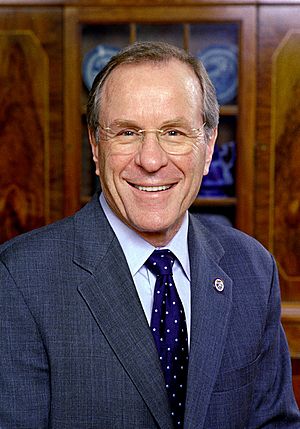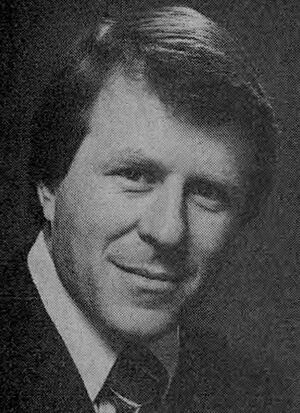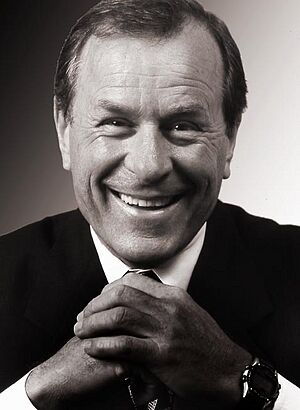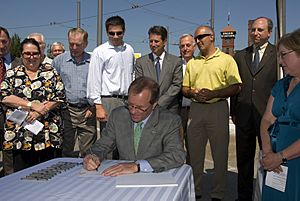Ted Kulongoski facts for kids
Quick facts for kids
Ted Kulongoski
|
|
|---|---|
 |
|
| 36th Governor of Oregon | |
| In office January 13, 2003 – January 10, 2011 |
|
| Preceded by | John Kitzhaber |
| Succeeded by | John Kitzhaber |
| Justice of the Oregon Supreme Court | |
| In office January 4, 1997 – June 18, 2001 |
|
| Preceded by | Richard Unis |
| Succeeded by | Thomas Balmer |
| 14th Attorney General of Oregon | |
| In office January 4, 1993 – January 4, 1997 |
|
| Governor | Barbara Roberts John Kitzhaber |
| Preceded by | Charles Crookham |
| Succeeded by | Hardy Myers |
| Member of the Oregon Senate from the 22nd district |
|
| In office August 2, 1977 – January 10, 1983 |
|
| Preceded by | Elizabeth Browne |
| Succeeded by | William Frye |
| Member of the Oregon House of Representatives from the 43rd district |
|
| In office January 13, 1975 – August 2, 1977 |
|
| Preceded by | David Stults |
| Succeeded by | Clinton Boehringer |
| Personal details | |
| Born |
Theodore Ralph Kulongoski
November 5, 1940 St. Louis, Missouri, U.S. |
| Political party | Democratic |
| Spouse | Mary Oberst |
| Children | 3 |
| Education | University of Missouri (BA, JD) |
| Military service | |
| Allegiance | |
| Branch/service | |
Theodore Ralph Kulongoski (born November 5, 1940) is an American politician, judge, and lawyer. He served as the 36th governor of Oregon from 2003 to 2011. He is a member of the Democratic Party.
Before becoming governor, he worked in many important roles in Oregon. He was part of both the Oregon Legislative Assembly (which makes laws) and served as the state's Insurance Commissioner. He was also the Oregon Attorney General from 1993 to 1997. Later, he became a justice on the Oregon Supreme Court from 1997 to 2001. Ted Kulongoski is special because he has worked in all three main parts of Oregon's state government: the part that makes laws, the part that carries out laws, and the part that interprets laws.
Contents
Early Life and Education
Ted Kulongoski was born in St. Louis, Missouri, in 1940. His father passed away when Ted was only one year old. He spent most of his childhood growing up in a Catholic boys' home.
After finishing high school, Kulongoski joined the Marines. This experience helped him pay for college through the G.I. Bill. He earned both his first degree and a law degree from the University of Missouri School of Law in 1970.
Career in Public Service
After law school, Kulongoski moved to Eugene, Oregon. He started his career as a lawyer who focused on helping workers. In 1974, he was elected to the Oregon House of Representatives, which is part of the state's lawmaking body. A few years later, in 1978, he was elected to the Oregon State Senate.
In 1980, he ran for a seat in the United States Senate but did not win. In 1982, he tried to become governor for the first time but was also unsuccessful.
In 1987, Oregon's Governor at the time, Neil Goldschmidt, chose Kulongoski to be the state's insurance commissioner. In this job, Kulongoski made important changes to the system that helps workers who get hurt on the job. These changes were praised for helping businesses save money.
Serving as Attorney General and Supreme Court Justice
In 1992, Kulongoski was elected as Oregon Attorney General. This role means he was the state's chief lawyer. As Attorney General, he worked on improving the system for young people involved in the justice system.
In 1996, instead of running for Attorney General again, he successfully ran for a position on the Oregon Supreme Court. This is the highest court in the state. He served as a justice until 2001, when he decided to leave the court to run for governor again.
Becoming Governor of Oregon
In 2002, Ted Kulongoski won the Democratic Party's nomination to run for governor. His main opponent was Republican Kevin Mannix. Kulongoski ran a calm campaign, focusing on his ability to bring people together and solve problems. He promised a practical way to fix the state's money problems and economic slowdown.
Kulongoski won the election and became governor on January 13, 2003. When he took office, Oregon was facing a big budget shortage and high unemployment. He also had to deal with issues related to the state's public employee pension system. As Governor, he was part of important groups like the National Governors Association.
Second Term as Governor
In 2006, Kulongoski ran for re-election as governor. He won the Democratic primary election with 54% of the votes. In the general election, he faced several opponents, including Republican Ron Saxton. On November 7, 2006, Kulongoski won a second term as governor.
During his second term, Governor Kulongoski focused on several key issues. In 2007, he worked to make sure Oregon had a clear message about reducing greenhouse gas emissions to fight climate change. He also joined a campaign called the "food stamp challenge," which showed how difficult it is to live on a small budget for food.
In May 2007, Kulongoski announced that Oregon would join the Climate Registry to keep track of dangerous greenhouse gases. He also signed two important laws that protect the rights of LGBT individuals in Oregon.
In May 2010, Kulongoski had a minor eye issue that required surgery, which was successfully completed.
Life After Governorship
After his time as governor ended in 2011, Ted Kulongoski continued to contribute to public service. He was appointed to the Public Safety Commission to review Oregon's sentencing rules. In 2012, he joined the faculty at Portland State University, where he taught in the school's Mark O. Hatfield School of Government.
Electoral History Summary
Ted Kulongoski ran for governor several times.
- In 1982, he ran for governor but was defeated by the Republican incumbent, Victor G. Atiyeh.
- In 2002, he won the Democratic primary and then narrowly won the general election to become governor.
- In 2006, he won the Democratic primary again and was re-elected for his second term as governor.
 | Stephanie Wilson |
 | Charles Bolden |
 | Ronald McNair |
 | Frederick D. Gregory |




